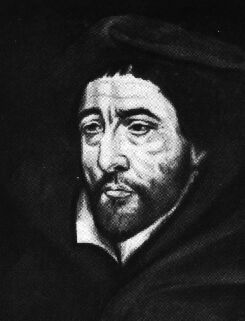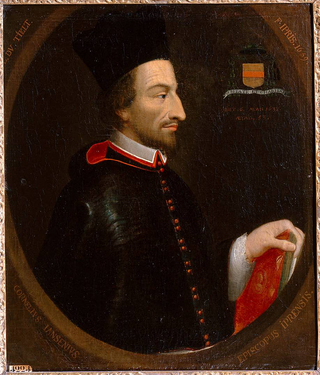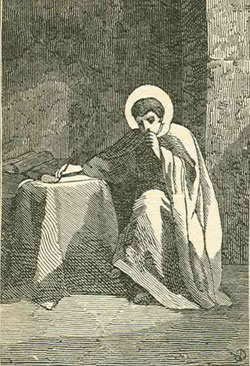This article relies largely or entirely on a single source .(August 2024) |
Charles Joseph Tricassin (Tricassinus) (b. at Troyes; d. in 1681) was a French Capuchin theologian. There is little information about his life.
This article relies largely or entirely on a single source .(August 2024) |
Charles Joseph Tricassin (Tricassinus) (b. at Troyes; d. in 1681) was a French Capuchin theologian. There is little information about his life.
He expounded Augustine of Hippo's doctrine of grace against the Jansenists. Thesee writings were violently attacked; they treat exhaustively both the Augustinian doctrine and that of Bonaventure. They comprise in the main:
Tricassin also published a commentary to several of Augustine's works to prove that Augustine calls the Pelagians heretical teachers, because they do not concede any necessity of grace for the will. He published at Paris in 1678 a French translation with explanations and applications of Augustine's books, De gratia et libero arbitrio, De correptione et gratia, as well as a treatise arguing that the Cartesian philosophy was contrary to the Catholic faith.

Augustine of Hippo, also known as Saint Augustine, was a theologian and philosopher of Berber origin and the bishop of Hippo Regius in Numidia, Roman North Africa. His writings influenced the development of Western philosophy and Western Christianity, and he is viewed as one of the most important Church Fathers of the Latin Church in the Patristic Period. His many important works include The City of God, On Christian Doctrine, and Confessions.

Jansenism was a 17th- and 18th-century theological movement within Roman Catholicism, primarily active in France, which arose as an attempt to reconcile the theological concepts of free will and divine grace in response to certain developments in the Roman Catholic Church, but later developing political and philosophical aspects in opposition to royal absolutism.
Vincent of Lérins was a Gallic monk and author of early Christian writings. One example was the Commonitorium, c. 434, which offers guidance in the orthodox teaching of Christianity. Suspected of semi-Pelagianism, he opposed the Augustinian model of grace and was probably the recipient of Prosper of Aquitaine's Responsiones ad Capitula Objectionum Vincentianarum. His feast day is celebrated on 24 May.

Michael Baius was a Belgian theologian. He formulated the school of thought now known as Baianism.

Cornelius Jansen was the Dutch Catholic bishop of Ypres in Flanders and the father of a theological movement known as Jansenism.

Prosper of Aquitaine, also called Prosper Tiro, was a Christian writer and disciple of Augustine of Hippo, and the first continuator of Jerome's Universal Chronicle.

Giles of Rome O.S.A. was a medieval philosopher and Scholastic theologian and a friar of the Order of St Augustine, who was also appointed to the positions of prior general of his order and as Archbishop of Bourges. He is famed as being a logician, who produced a commentary on the Organon by Aristotle, and as the author of two important works: De ecclesiastica potestate, a major text of early-14th-century papalism, and De regimine principum, a guide book for Christian temporal leadership. Giles was styled Doctor Fundatissimus by Pope Benedict XIV.
Semi-Pelagianism is a historical Christian theological and soteriological school of thought about the role of free will in salvation. In semipelagian thought, a distinction is made between the beginning of faith and the increase of faith. Semi-Pelagian thought teaches that the latter half – growing in faith – is the work of God, while the beginning of faith is an act of free will, with grace supervening only later.

Caesarius of Arles, sometimes called "of Chalon" from his birthplace Chalon-sur-Saône, was the foremost ecclesiastic of his generation in Merovingian Gaul. Caesarius is considered to be of the last generation of church leaders of Gaul who worked to integrate large-scale ascetic elements into the Western Christian tradition. William E. Klingshirn's study of Caesarius depicts Caesarius as having the reputation of a "popular preacher of great fervour and enduring influence". Among those who exercised the greatest influence on Caesarius were Augustine of Hippo, Julianus Pomerius, and John Cassian.
Baianism is a term applied to the school of thought of Catholic theologian Michael Baius (1513-1589). Its foremost apologists, Baius among them, largely claimed this school and its teachings to be a return to a sort of Augustinianism, against the reliance on Scholasticism and Scholastic writings which held sway over most Catholic theologians at the time. It is the immediate historical predecessor of Jansenism, and, as with Jansenism, has been deemed heterodox by the Catholic Church.

Augustinus seu doctrina Sancti Augustini de humanae naturae sanitate, aegritudine, medicina adversus Pelagianos et Massilianses, known by its short title Augustinus, is a theological work in Latin by Cornelius Jansen. Published posthumously in Louvain by Jacobus Zegers in 1640, it was in three parts:

The history of the Calvinist–Arminian debate begins in the early 17th century in the Netherlands with a Christian theological dispute between the followers of John Calvin and Jacobus Arminius, and continues today among some Protestants, particularly evangelicals. The debate centers around soteriology, or the study of salvation, and includes disputes about total depravity, predestination, and atonement. While the debate was given its Calvinist–Arminian form in the 17th century, issues central to the debate have been discussed in Christianity in some form since Augustine of Hippo's disputes with the Pelagians in the 5th century.

Faustus of Riez was an early Bishop of Riez (Rhegium) in Southern Gaul (Provence), the best known and most distinguished defender of so-called Semipelagianism.

William of Auvergne, also known as William of Paris, was a French theologian and philosopher who served as Bishop of Paris from 1228 until his death. He was one of the first western European philosophers to engage with and comment extensively upon Aristotelian and Islamic philosophy.
Catholic dogmatic theology can be defined as "a special branch of theology, the object of which is to present a scientific and connected view of the accepted doctrines of the Christian faith."
Jean Nicolaï was a French Dominican theologian and controversialist.
De libero arbitrio voluntatis, often shortened to De libero arbitrio, is a book by Augustine of Hippo which seeks to resolve the problem of evil in Christianity by asserting that free will is the cause of all suffering. The first of its three volumes was completed in 388; the second and third were written between 391 and 395. The work is structured as a dialogue between Augustine and his companion Evodius; it ranges over several topics, and includes an attempted proof of the existence of God.
The Second Council of Orange was held in 529 at Orange, which was then part of the Ostrogothic Kingdom. It affirmed much of the theology of Augustine of Hippo and synergism, and made numerous proclamations against what later would come to be known as semi-Pelagian doctrine.

Augustinianism is the philosophical and theological system of Augustine of Hippo and its subsequent development by other thinkers, notably Boethius, Anselm of Canterbury and Bonaventure. Among Augustine's most important works are The City of God, De doctrina Christiana, and Confessions.
Augustinian soteriology, influenced by Augustine of Hippo early engagements with Stoicism, Neoplatonism, and Manichaeism, played a crucial role in shaping Christian theology. Initially opposing deterministic views, Augustine later integrated aspects of these philosophies, especially during his disputes with the Pelagians. His doctrines, such as predestination by predeterminism, laid the groundwork for later theological developments. Augustine's influence on John Calvin was particularly significant in shaping Calvinist soteriology and understanding of divine providence.
![]() This article incorporates text from a publication now in the public domain : Herbermann, Charles, ed. (1913). "Charles Joseph Tricassin". Catholic Encyclopedia . New York: Robert Appleton Company.
This article incorporates text from a publication now in the public domain : Herbermann, Charles, ed. (1913). "Charles Joseph Tricassin". Catholic Encyclopedia . New York: Robert Appleton Company.